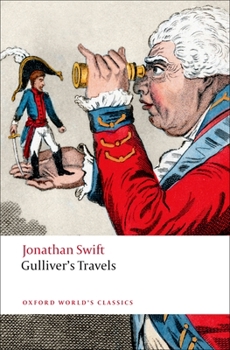Gulliver's Travels
Select Format
Select Condition 
Book Overview
In Gulliver's Travels, the narrator represents himself as a reliable reporter of the fantastic adventures he has just experienced. But how far can we rely on a narrator who has been impersonated by someone else? The work purports to be a travel book, and describes the shipwrecked Gulliver's encounters with the inhabitants of four extraordinary places: Lilliput, Brobdingnag, Laputa, and the country of the Houyhnhnms. An extraordinarily skillful blend...
Format:Paperback
Language:English
ISBN:0199536848
ISBN13:9780199536849
Release Date:January 2008
Publisher:Oxford University Press
Length:432 Pages
Weight:0.68 lbs.
Dimensions:0.8" x 5.1" x 7.7"
Age Range:10 years and up
Grade Range:Grade 5 and higher
Related Subjects
13 - 17 Years 9 - 12 Years Classics Fiction Humanities Literary Literature Literature & FictionCustomer Reviews
3 ratings
A great text that will live on for centuries
Published by Thriftbooks.com User , 18 years ago
Swift's Gulliver's Travels is one of the smartest British novels ever written. It is a funny, sharp, poignant, and startling look at human nature. The most interesting part of the novel is the many conversations between Gulliver and the Houyhnhnm master relating to the causes of war and other aspects of human nature. This novel is a wonderful reflection of human society that really makes the reader question his or her methods or discourse.
A mixed bag
Published by Thriftbooks.com User , 23 years ago
Asimov does his typically thorough job of annotating, filling this book with tons of information about obscure references and historical tidbits. However, I was a bit dismayed at Asimov's heavy-handed critique of Swift in the 3rd book. As many readers of Swift know, the 3rd book contains a very harsh criticism of science and technology. Asimov decides to use his annotations to defend science. While his aims are certainly admirable, I think that he takes Swift's comments out of context in an effort to prove his own case.That minor cavil aside, this is an excellent book for young people studying this great classic of literature, and for fans of both Swift and Asimov.
HUMANS: BIG AND LITTLE, UNWISE AND UNCOUTH
Published by Thriftbooks.com User , 24 years ago
GULLIVER'S TRAVELS can be looked at in at least two different ways. On a stand alone basis, it is a satire written by a misanthrope, but if taken within the context of his overall body of work, it can also be perceived as a satire written by a man with a deep concern for mankind.Part I and Part II satirize Englishmen, their religion, politics, and their government. Parts III and IV satirize humanity on a much broader scale.In Part I, we find Lemuel Gulliver shipwrecked on the Island of Lilliput where the average inhabitant is about six inches tall. They are actually small in both body and mind. English religion and politics are satirized by descriptions of those who wear high heels and those who wear low heels, and by the dispute between those who feel their eggs should be broken at the big end and those whose preference is the small end. Like England, through much of history, the Lilliputians are constantly at war with their traditional enemies from across the chanel.In Part II, Gulliver is again stranded, this time on Brobdingnag, where the size proportions are just the opposite as in Part I. Here, Gulliver is tiny in relation to the inhabitants. Here, too, England, and to some extent all of humankind, are taken to task. After Gulliver has described European manners, customs, and behaviour to the king, the king comments that "I cannot but conclude (that) the bulk of your natives (are) the most pernicious race of odious vermin . . . . to crawl on the face of the earth."Part III takes on the world of scientists, philosophers, historians, and "projectors." On the flying Island of Laputa, the continent of Lagado, and the Islands of the Sorcerers and Immortals, He meets wise men who spend their lives in speculation but can't handle the practical necessities of life, professors who dedicate their lives to extracting sunlight from cucumbers, and immortals who reveal history to be nothing more than a series of deceptions.Finally, in Part IV, he finds himself in the country of the Houyhnhnms, who are horses with the power to reason. These horses lead clean and simple lives in contrast to the humans, known as Yahoos, who are filthy, brutal, and uncouth. In the Yahoos, Gulliver recognizes the human race, and after finally returning home, he can never again be comfortable in the company of other humans.Read by itself, GULLIVER'S TRAVELS is a satire on the foibles, weaknesses, and petty corruptions of the human race in general, and English politicians in specific, as written by a rather bitter misanthrope. That is a correct reading, but not necessarily the only one. Read in the context of many of Swift's other works, particularly his many political pamphlets, I think that it can be perceived as a satirically inventive work written by a man who really cares about the future of the human race.As an aside, Gulliver's visit to Lilliput has, through the years, enchanted countless numbers of children. It is in this section that we get a peek at
Gulliver's Travels into Several Remote Nations of the World. In Four Parts. By Lemuel Gulliver, First a Surgeon, and then a Captain of Several Ships Mentions in Our Blog

Creative Linguistics: Novels Introducing a Novel Tongue
Published by Ashly Moore Sheldon • July 01, 2021
Authors have the magical ability to create fictional worlds so immersive and tangible that we readers may have a hard time coming back to reality. This involves thinking through every detail of an imaginary universe. Sometimes it means inventing a brand new language!






